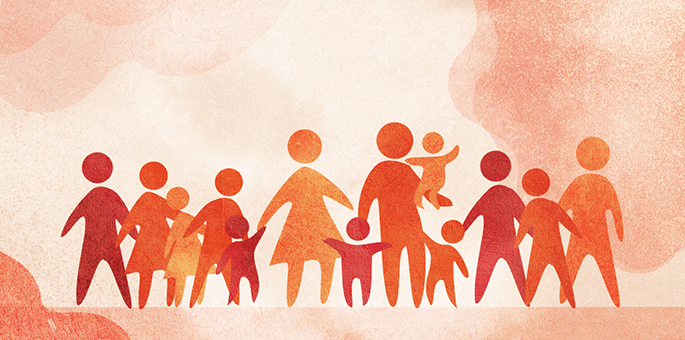Before the global pandemic struck, my husband and I were fortunate to travel to many different parts of the world. We made sure to stop at local Chabad Houses, speaking to rabbis and rebbetzins about their communities and their lives. When we look back at these visits, we remember the families of shluchim—emissaries of the Lubavitcher Rebbe—for their smiles and genuine joy. Regardless of their location or the challenges of their mission, these extraordinary leaders create an atmosphere of authentic connection and friendliness wherever they are.
About 10 years ago, my husband and I visited a Chabad in Cusco, a city in the Peruvian Andes known for its proximity to a historic site of Machu Picchu. The Chabad House had a courtyard where the children of the shluchim played with each other. They had no other friends and not much of a recreational area except for their small yard. The family made their own cheese, as well as baked delicious bread and other treats for their family and visitors. They generously gave to thousands of tourists who paid a visit on the way to Machu Picchu. Despite living in a Third World country without basic necessities that we take for granted, this family met these challenges with peacefulness and an unwavering commitment to their mission.
In Marrakesh, Morocco, despite a language barrier, we shared the most delicious Shabbat meals at the home of the Chabad family, connecting through smiles and songs. Most youth have left the country, and the children of our hosts lived in France. Yet despite being separated from their families, the atmosphere was that of celebration and happiness.
While at a conference in Albuquerque, N.M., my husband and I shared a meal with a Chabad family who explained that all of their children were homeschooled. This was a common practice for the children of the shluchim when no Jewish schools were available. I was astonished to learn that the children never “leave” in the morning, as my children did. Despite having no Jewish school in the area, both parents and children were grateful and content. They were on the mission, sent by the Rebbe to serve the Jewish people, and as long as they were focused on that purpose, there was positivity and unconditional giving.
I grew up in a country where people did not openly display their feelings, especially those of positivity. In the former Soviet Union, critiques were common and compliments rare. Children would be reprimanded in public, and the overall society didn’t focus on positive emotions.
After my family’s immigration to the United States in 1989, it felt so strange to see that people in public smiled and greeted each other, or that a stranger in the park inquired about our day. Many fellow immigrants could not embrace this overall feeling of lightheartedness. To us, this politeness seemed superficial and meaningless. We were used to a different, “heavy” type of culture. Soviet philosophy made us acutely aware of all the problems in our lives and in the world; therefore, it seemed irresponsible to be happy and not constantly dwell on our struggles.
When I began returning to my Jewish heritage, I was invited to many Shabbat and holiday celebrations in the homes of observant families. I was greeted with cheerful, welcoming attitudes. Eventually, this type of easy-going calmness drew me into the world of the Torah observant lifestyle. Communism had taught me to perceive my reality through an atheistic lens of an anxious and chaotic “truth.” Jewish values and traditions created an atmosphere of serenity and trust in the Master plan.
During the travel halt that the coronavirus pandemic brought to the world, I reflected on our journeys and was able to identify the common theme of our experiences. The families at the Chabad Houses were not oblivious to the challenges of their lives. They remained positive because they were acutely aware of their purpose. This connection to their mission allowed them to transcend obstacles without negativity or despair.
Despite the difficulties, it was possible to remain content—to nurture relationships, serve a community, raise a family, build a financial infrastructure and educate others with authentic joy and kindness.
During the Super Bowl in 2017, we visited a cold and snowy Minneapolis in Minnesota. Despite the freezing weather, we were greeted in the most heartwarming manner that warmed not just our bodies but also our souls. We spent Shabbat at the West S. Paul Chabad house with the community members and fellow visitors from all walks of life. Looking through the window at the ‘never-ending’ snowfall, I remember thinking that it must not be easy to be living in such a cold environment. Long after we left, this unforgettable Shabbat experience continued to warm our hearts.
Every situation can be viewed as a crisis or an opportunity. We have no control over our circumstances, yet we can choose how to view reality through the lens of positivity and inner calmness.
Despite the cynicism of the Communist regime, I have learned to perceive my reality very differently. The fundamental principle of Jewish wisdom is to “Love your fellow as yourself.”
From my visits to Chabad Houses around the world, I have seen that a sincere smile and genuine word of kindness is the most generous gift. When our mission of serving others is clearly identified, obstacles become an opportunity, challenges create growth, and happiness becomes a choice.
Dedicated to Rebbetzin Feller, Rebbetzin Kripor, Rebbetzin Schmukler, the “keepers” of Marrakech community and thousands of Jewish women around the world who make a choice to be the conduits of light and positivity.
What I Learned From Chabad Families Around the World – Reflections

